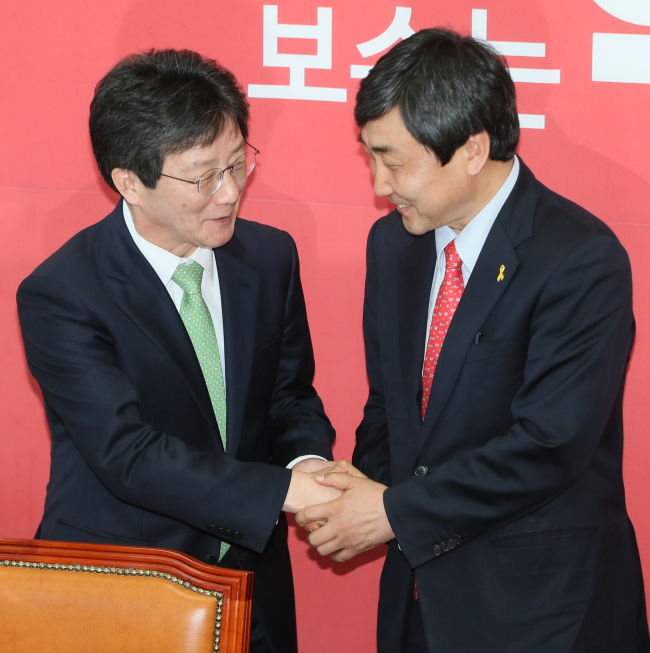Prospects for the May extraordinary session of the National Assembly remain bleak as rival parties lock horns over the stalled bill on civil servants’ pension reform, even as the presidential office is adding pressure on both to swiftly pass it.
Lawmakers are to hold a 30-day extra session starting Monday to pass a package of pending bills awaiting their approval. But the partisan standoff over the pension reform bill is likely to be a stumbling block as the rival parties continued to wrangle over the conditions to be attached to the bill.
Saenuri floor leader Rep. Yoo Seung-min on Sunday said he would “respect” an agreement made by party leaders on the bill. But he didn’t elaborate on whether the ruling party would accept the opposition’s demand.
Last week, parties failed to pass the bill as the main opposition New Politics Alliance for Democracy demanded that the revision explicitly state that the income-replacement rate of the national pension would be raised to 50 percent, from the current 40 percent. The income-replacement rate is the figure multiplied to a pensioner’s average lifetime monthly income.
The ruling Saenuri Party rejected the demand in the face of fierce criticism from Cheong Wa Dae, making a U-turn from its agreement with the opposition party to affiliate the issue of raising the payout rates to the bill.
 |
| Saenuri Party Floor Leader Yoo Seung-min (left) shakes hands with Lee Jong-kul, newly-elected counterpart of New Politics Alliance for Democracy at the National Assembly, Seoul, Sunday. (Yonhap) |
Cheong Wa Dae pressured both parties on Sunday to pass the bill during the extra session, and urged them not to mention any changes to the national pension system in the bill. Senior press secretary Kim Sung-woo explained that the increase of the income replacement rate to 50 percent would require an infusion of 1,702 trillion won in taxpayers’ money over the next 65 years.
“An increase of even one percentage point (in the income replacement rate) may pass a disastrous burden on to future generations,” said Kim at a press briefing.
“It is not appropriate to link the national pension to the civil servant pension because such changes require prior agreement from the citizens,” he said.
NPAD’s newly-elected floor leader Lee Jong-kul, however, refused to step back and held the ruling party accountable for failing to pass the pension reform bill.
“We should honor our agreement on the pension reform bill. If not, those involved need to be held accountable” said Lee in his first official meeting with Rep. Yoo.
On May 2, leaders of rival parties ― Kim Moo-sung of Saenuri and Moon Jae-in of NPAD ― agreed to raise the contribution rate of public service pensions from 7 percent to 9 percent in the next five years, while reducing entitlements from 1.9 percent to 1.7 percent in stages over 20 years. Because of this agreement, the bill on civil servants’ pension reform was widely expected to be passed at the plenary session last week. But another, unexpected condition attached to the agreement involving a change in national pension system instantly sparked concerns from the government. Top officials, including Welfare Minister Moon Hyung-pyo, blasted the parties for acting outside their authorities and said it was a matter that required public approval to even begin discussions.
Other than the pension bill, lawmakers from rival parties are facing demands to pass the tax-code revision bill.
It is aimed at allowing taxpayers to receive deserved tax refund by the end of this month. The bill, designed to alleviate the undue tax burden, needs to get parliamentary endorsement by Monday to allow the government to implement the plan as it promised the people.
“It is regrettable that the bill failed to pass the National Assembly in April. We might not deliver on our promise to the taxpayers unless the Assembly passes the bill no later than May 11,” said Finance Minister Choi Kyung-hwan.
Next in line is a bill for free child care program. It aims to fund an education subsidy, called Nuri Curriculum, a government-sponsored free child care program for children aged 3 to 5. The bill has been awaiting approval since last year.
Other economic-related bills, such as legalizing crowdfunding and allowing corporates to engage in subcontracting, are expected to be discussed at the plenary session. Those pending bills, however, are likely to face partisan bickering as rival parties have debated the details of the bills.
Lawmakers will also discuss whether to legalize putting graphic images of tobacco’s side effects on cigarette packs. The Assembly’s Legislation and Judiciary Committee approved the bill on May 1 to mandate tobacco companies put images to highlight the dangers of smoking.
By Cho Chung-un and Yeo Jun-suk
(christory@heraldcorp.com) (jasonyeo@heraldcorp.com)



